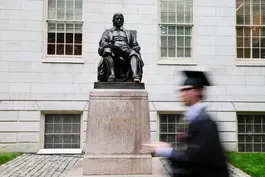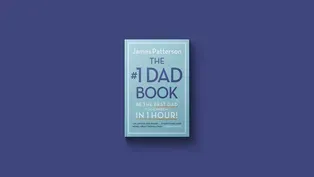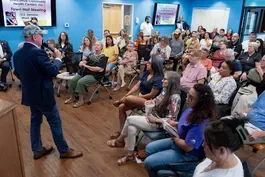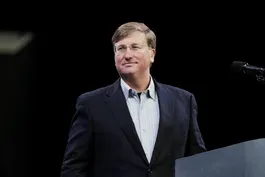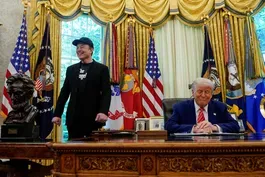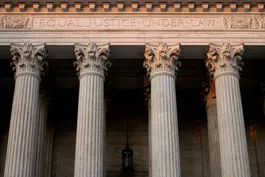
Brooks and Capehart on Musk's impact on the U.S. government
Clip: 5/30/2025 | 10m 10sVideo has Closed Captions
Brooks and Capehart on Elon Musk's impact on the U.S. government and agencies
New York Times columnist David Brooks and Washington Post associate editor Jonathan Capehart join Amna Nawaz to discuss the week in politics, including Elon Musk's legacy as his time in the White House comes to an end, members of Congress facing more pushback from voters over the Trump agenda, the president's controversial pardons and Russia's attacks on Ukraine intensifying.
Problems playing video? | Closed Captioning Feedback
Problems playing video? | Closed Captioning Feedback
Major corporate funding for the PBS News Hour is provided by BDO, BNSF, Consumer Cellular, American Cruise Lines, and Raymond James. Funding for the PBS NewsHour Weekend is provided by...

Brooks and Capehart on Musk's impact on the U.S. government
Clip: 5/30/2025 | 10m 10sVideo has Closed Captions
New York Times columnist David Brooks and Washington Post associate editor Jonathan Capehart join Amna Nawaz to discuss the week in politics, including Elon Musk's legacy as his time in the White House comes to an end, members of Congress facing more pushback from voters over the Trump agenda, the president's controversial pardons and Russia's attacks on Ukraine intensifying.
Problems playing video? | Closed Captioning Feedback
How to Watch PBS News Hour
PBS News Hour is available to stream on pbs.org and the free PBS App, available on iPhone, Apple TV, Android TV, Android smartphones, Amazon Fire TV, Amazon Fire Tablet, Roku, Samsung Smart TV, and Vizio.
Providing Support for PBS.org
Learn Moreabout PBS online sponsorshipAMNA NAWAZ: Well, here to discuss all the week's political news now is Brooks and Capehart.
That is New York Times columnist David Brooks, and Jonathan Capehart, associate editor of The Washington Post.
Great to see you both.
JONATHAN CAPEHART: Hey, Amna.
AMNA NAWAZ: Let's jump in with the headline about Elon Musk we reported on earlier today.
Today was his last day as a special government employee.
We had that extraordinary press conference we reported on in the Oval Office.
And there are a lot of questions about what exactly he and his DOGE team were able to do and actually accomplish.
Jonathan, when you look at this, step back, this unprecedented chapter of a private, unelected billionaire who had all of this power in the executive office, what do you think the impact was?
What did he get done?
JONATHAN CAPEHART: Well, he got a lot done, but it wasn't anything good.
I mean, I remember him running around the CPAC.
It was CPAC with the chain saw, but really he took a wrecking ball to the federal government, just whacked through agencies and departments, while at the same time scooping up all of our private data.
And so he leaves Washington after 130-so days, leaving behind just the wreckage of what his DOGE team has done.
AMNA NAWAZ: David, how do you look at it?
What's his legacy, if we know that yet?
DAVID BROOKS: Yes, I'm not sure it was wreckage.
There was wreckage if you're at NIH.
There are wreckage at certain agencies, but the guy only saved $65 billion out of a multitrillion-dollar budget.
So, as a budget matter, you would not say he had a big effect, but he did manage to destroy NIH and USAID.
And the USAID one is the one I haven't gotten over.
And so there's folks at Boston University who count, how many people have died because of what DOGE did at USAID?
And USAID was a very ill-managed organization.
That's true.
But according to the Boston University folks, so far, 55,000 adults have died of AIDS in the four months since Trump was elected, 6,000 children are dead because of what DOGE did.
That's just PEPFAR, the HIV.
You add them all up, that's 300,000 dead, and we're four months in.
Now, you add, accumulate that over four years, the number of dead grows very high.
There are mass murderers in the world, Pol Pot, Mao Tse-Tung, Stalin.
We don't have anybody on the list from America.
And I don't think it's the same as committing the kind of genocide they did.
But by taking away that agency and being at least semi-responsible for the deaths of probably by the end of this hundreds of thousands of millions of people, that's Elon Musk's legacy.
And the people who work at Tesla and SpaceX may want to think about that.
AMNA NAWAZ: And those are real lives, it's worth pointing out, every single one of them lost.
What about this, what we saw in Lisa's report there about the anger at town halls?
You will recall over the last few months, there was a lot of anger about the DOGE cuts directed at Elon Musk.
Jonathan, what do you take away from what Lisa was reporting on now in terms of how people are showing up and what they're concerned about?
JONATHAN CAPEHART: They're still angry.
First, it was DOGE.
Now it's the big, beautiful bill.
And you just put them all together, because I think, for the American people, it's all part of the same messy, ugly stew.
And, on the one hand, the Republicans are facing anger from their constituents, one, because they won't show up for town halls anymore.
And then Democrats are facing not as much anger.
They're facing frustration from their constituents, because they look at their Democratic elected leaders and say, we sent you there, do something.
And we at this table know there is only so much that Democrats can do because they are not in the majority, not in the House, not in the Senate, certainly not in the White House.
So all they have is the ability to slow things down if they're in the Senate, go to their Republican colleagues' districts if they're in the House, and to just speak out loudly -- as loudly as they can.
But that's as far as it goes.
But the anger among the electorate is -- it's still there, it's palpable, and, as time goes on, it's going to become more and more bipartisan.
AMNA NAWAZ: What do you make of that?
You agree?
DAVID BROOKS: I don't think it's bipartisan yet.
It may become that.
Even if you go to Montana, a red state, 40 percent of the state is Democrats.
And when I see the town hall videos that I have seen, it looks like Democrats talking and being really angry, which they should be.
And they should do resistance and they should show up at town hall meetings and they should make themselves heard.
But it's not the same as Republicans beginning to flake off.
We just don't see that in the numbers.
But what's going to happen?
To me, it's not even anything that's happened so far.
Donald Trump is increasing the national debt if his big, better bill, whatever that thing's called, goes through, by $6 trillion.
How inflationary will that be to dump that much money into the money supply?
At the same time, tariffs are going up.
Steel tariffs were just raised again today, raising the cost of anything made out of steel and anything made out of children's toys.
And so the Republican anger will come, if it comes, when those big effects hit the economy like a wrecking ball, to use Jonathan's word?
(LAUGHTER) AMNA NAWAZ: Wrecking balls here tonight.
DAVID BROOKS: And so that's when we will begin to see some real Republican anger.
AMNA NAWAZ: I want to get both of your takes too on the other big headline from this week, which was a flurry of pardons we saw from President Trump, really running the gamut from reality TV stars, to rappers, to former politicians, to commuting the sentence of a notorious former Chicago gang leader.
Jonathan, kick us off.
When you look at this, what do you make of it?
What's the common thread tying these together?
JONATHAN CAPEHART: Seems to me, the common thread is, the person who got the pardon or the commutation or whatever it is they got from the president, it's either they said something nice about him or someone he knows said something to him about the person.
Maybe he or his family benefited financially through some -- one of the myriad ways folks can give some benefit to the president.
I think that is the common line.
This is not about -- so much about loyalty.
Maybe with the reality TV stars, it's about liking the president.
But we know there is no -- loyalty is not a two-way street with this president.
So it's not about loyalty.
It's about fealty.
AMNA NAWAZ: David, there's this.
There's also Mr. Trump saying, messaging that he might look at pardoning the men who were convicted of trying to kidnap Michigan Governor Gretchen Whitmer.
How do you look at this?
DAVID BROOKS: Yes, first to praise what he did.
He did pardon NBA YoungBoy.
For the few "News Hour" viewers who don't know who NBA YoungBoy... (LAUGHTER) DAVID BROOKS: ... he's a hip-hop artist who drifts into the gangsta style.
AMNA NAWAZ: Goodness, David... (CROSSTALK) DAVID BROOKS: I was cheering.
JONATHAN CAPEHART: Go on, David.
DAVID BROOKS: But all the rest, they're sleazeballs.
I mean, you look at it.
It's fraud.
It's corruption.
It's bribery.
AMNA NAWAZ: Yes.
DAVID BROOKS: It's making old people suffer so you can invest in a yacht.
It's just disgraceful things.
And the pardon authority is supposed to be for people who are near the end of their terms, who have repented, who have built new lives.
And Trump is oblivious to that.
It's not only he disagrees.
I convinced he's oblivious and he just doesn't think in those terms.
And he thinks, are these people nasty to my enemies?
And are these people likely to show up at my parties?
And if you make those two categories, then nasty to my enemies, free them.
And I once -- I have talked about this on the show -- got to go to a Donald Trump party, and it was not Mother Teresa and the saints.
It was every third bit New York semi-gangster.
And that was his circle.
And it's still a bit of a circle.
And he's pardoning his friends.
But it is an erosion of the norms of what standard -- what constitute good behavior, but even criminal behavior.
AMNA NAWAZ: Meanwhile, overseas, I want to ask you about what we saw this week with continuing Russia's really intensifying attacks on Ukraine.
And we saw Ukrainian President Zelenskyy in Europe trying to shore up support.
Meanwhile, we saw President Trump, who had promised once upon a time to end the war on day one really lashing out at Russian President Vladimir Putin online in multiple posts, saying Putin has gone absolutely crazy, saying he's playing with fire.
Jonathan, he used to hold up their relationship as a way that he would have leverage to bring Putin to the negotiating table.
What's happening here right now?
JONATHAN CAPEHART: He got played.
I mean, honestly, he thought that he was going to end -- no one thought he was going to end this war on day one, except him.
And he thought he had some special relationship.
Maybe he did.
But then, once he got into the White House, he has discovered that the Russian president has his own interests in his own goals.
And he's been making it clear since January 20 that he's going to keep pushing toward -- meaning Putin, pushing towards those goals.
So the president can be -- President Trump can be as frustrated as he wants to be, but he only has himself to blame.
He has not been serious at all about bringing a just conclusion to Russia's war on Ukraine.
AMNA NAWAZ: David, we're seeing some senators on the Republican side call on him to sanction Putin, to take a tougher stance.
Will he?
DAVID BROOKS: It's -- I don't know.
He - - for a guy who understands leverage, he's played his leverage very badly.
And so Vladimir Putin wants to win this war.
And if Donald Trump makes it easier for Vladimir Putin to win this war, then Vladimir Putin is not going to sue for peace.
That's -- you don't have to be Henry Kissinger to understand that.
And so he's done this, and then occasionally, even on January 22, I think, he's shown some anger at Putin and made threats.
Did he follow through on those threats?
Absolutely not.
And so he can issue a tweet or a social -- TRUTH Social, whatever it is, but is he actually going to show up and actually punish Putin in a way that he will feel the hurt?
I really not sure he's going to do that.
David Ignatius, Jonathan's colleague at The Post, had a very good column on how Putin has played him.
And one of the ways Putin has played him is that he's gotten Steve Witkoff, our special envoy to the Middle East and Russia, super locked into this Russia's sovereign wealth fund.
And so suddenly there's all this money at his feet.
And that's the kind of thing that talks in the Trump White House.
So will he sanction Russia?
We will believe it when we see it.
AMNA NAWAZ: We will believe it when we see it.
David Brooks, Jonathan Capehart, always great to see you both.
Thank you.
JONATHAN CAPEHART: Thanks, Amna.
Harvard professor calls Trump's attacks 'authoritarianism'
Video has Closed Captions
Clip: 5/30/2025 | 8m 50s | Harvard professor calls Trump's attacks on funding and students 'authoritarianism' (8m 50s)
James Patterson reflects on fatherhood in 'The #1 Dad Book'
Video has Closed Captions
Clip: 5/30/2025 | 6m 47s | James Patterson reflects on fatherhood and what it means to him in 'The #1 Dad Book' (6m 47s)
Members of Congress face frustrations over the Trump agenda
Video has Closed Captions
Clip: 5/30/2025 | 3m 21s | Members of Congress face frustrations over the Trump agenda from voters at home (3m 21s)
Mississippi governor on Medicaid, disaster funding impacts
Video has Closed Captions
Clip: 5/30/2025 | 7m 44s | Mississippi governor on how changes to Medicaid, disaster funding could impact his state (7m 44s)
Musk leaves White House after cutting to jobs and agencies
Video has Closed Captions
Clip: 5/30/2025 | 7m 18s | Elon Musk leaves White House position after overseeing slashing of jobs and agencies (7m 18s)
News Wrap: Supreme Court lets Trump strip migrant status
Video has Closed Captions
Clip: 5/30/2025 | 7m 10s | News Wrap: Supreme Court lets Trump strip humanitarian parole protections from migrants (7m 10s)
Providing Support for PBS.org
Learn Moreabout PBS online sponsorshipSupport for PBS provided by:
Major corporate funding for the PBS News Hour is provided by BDO, BNSF, Consumer Cellular, American Cruise Lines, and Raymond James. Funding for the PBS NewsHour Weekend is provided by...
